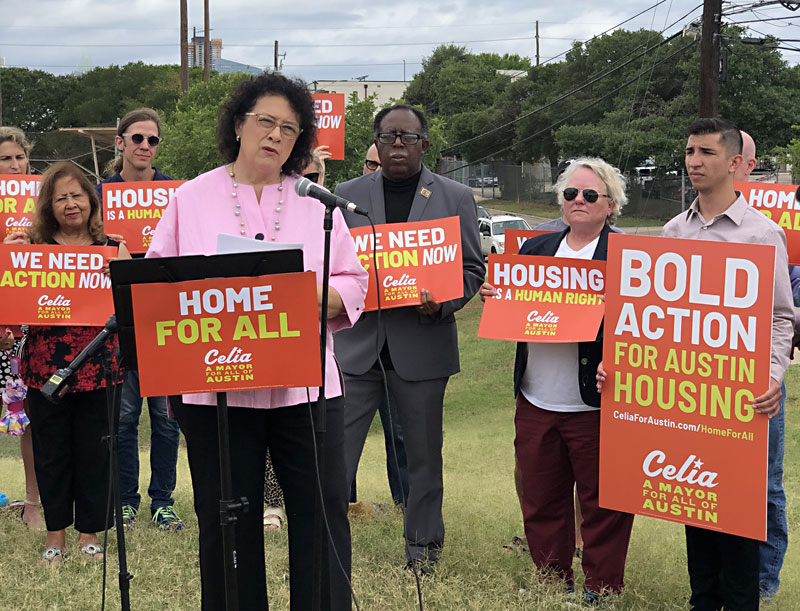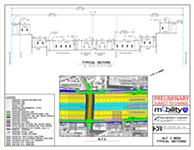Austin at Large: Housing and the Mayor’s Race
Celia Israel: “This election is about who can afford to live here, and who gets to decide”
By Mike Clark-Madison, Fri., June 10, 2022

The City Council election cycle has barely begun in earnest and the filing deadline is still two months away, but state Rep. Celia Israel has jumped to the front of the mayoral race as far as actual campaigning is concerned. Last week, Israel – likely to be the major contender most amenable to Austin's left – sought first-mover advantage as the mayoral aspirants debate solutions to the city's biggest problem. "The interests of a powerful few fostered a fundamental misunderstanding of the needs of our city, and have created a historic housing crisis," she writes on her website to introduce her "Home for All" proposals. "The housing shortage is pricing the workforce we depend on the most out of the city limits. We need to keep Austin affordable for teachers, nurses, public service workers, childcare providers, artists, retail service employees and more."
What Israel proposes in "Home for All" is a mixture of best practices to achieve incremental increases in density that other cities, even ones like Dallas, have managed to translate into new housing that isn't all the way out on the cheapest edges of town, the only kind of new workforce housing Austin has managed to produce in about two decades. Some of these ideas have been discussed and studied and mulled in Austin for a while, making the customarily slow journey to implementation; for example, Israel's proposals to make it easier for homeowners to build accessory dwelling units overlap with code amendments Council is considering at today's June 9 meeting. She calls for process improvements to reduce the bureaucratic and fiscal cost and drag that the city imposes on anyone trying to build anything, but especially housing. She has an eye specifically on producing missing-middle projects (from three to 12 units) "that provide lower cost housing while maintaining neighborhood character and allowing more Austin families to thrive."
We've Seen This Place Before
As Austin begins to realize that the most vital and sustainable parts of town are those that kinda just figured out on their own how to live with growth and change, without endless drama, it's probably good that Israel's "Home for All" package isn't really as transformative as its framing may suggest. (As Israel knows firsthand, some of what's possible is simply trammeled by state law.) It features many of the ideas and initiatives you've read about in these pages – not just ADUs and missing-middle housing, but community land trusts, extending the city's rent support program (begun with COVID-19 relief funds), assessing the cost to builders of the city's own regulations, and beginning the process of rezoning dying retail and office properties into places where people can live. And, of course, overhauling the city's broken permitting process, which has eluded repair for about 40 years.
Israel is not yet promising new and different policies that have hitherto been beyond the political pale, even though they might be what's needed. That might (but probably won't) insulate her from attacks from the NIMBY slimeballs who've slandered so many who have worked in good faith to fix the many things that are broken about how Austin creates its built environment. As mainstream as "Home for All" is, Israel is correct in saying, "Some will surely consider this plan too bold." Those people may be in Kathie Tovo's camp, if the longest-serving member of Council follows through with a mayoral bid. (She designated a campaign treasurer in March and this week endorsed a successor in the District 9 race, longtime neighborhood leader and parks advocate Linda Guerrero.) Or they might just go ahead and vote for the leading Republican, Jennifer Virden.
New Rules for Radicals
After the "too bold" stuff, Israel continues on her site: "But I welcome the debate. Our city is at a crisis point. This election is about who can afford to live here, and who gets to decide." Israel is a middle-aged, married, Democratic woman with a college degree, like so many Austin voters, so she gets the city's political vibe despite being less familiar with City Hall than Tovo or Kirk Watson, who served as mayor 25 years ago, but much hasn't changed about Austin politics in those 25 years.
Watson could probably sign off on everything in "Home for All," while Tovo would (continue to) figure out ways to slow and stall and neuter things she feels would be too disruptive. In related news, rents in Austin increased about 40% last year, and the city's population grew at a measly 0.5% from 2020 to 2021, the slowest rate in years. In that same time frame, the five-county Austin metro area continued to grow far faster than nearly every other in America, and the two fastest-growing cities in the country were Georgetown and Leander.
What stands out in "Home for All" is the firmness and edge with which Israel is laying blame for the housing crisis at someone's feet – "the interests of a powerful few," "who gets to decide," etc. She doesn't say "central city homeowners" explicitly, but we know what she means. In language that could be aimed straight at Tovo, she notes: "We need more housing, not 10 years of debate over a complicated mix of community benefits to move forward." Watson is building his campaign on his ability to Get Shit Done, but he has yet to publicly divorce himself from the bad parts of the central-city consensus he helped create. Israel is taking advantage of not having a record at City Hall to defend to position herself as the candidate of change, the voice of Austinites who want city leaders to rise to the challenge before the community.
Got something to say? The Chronicle welcomes opinion pieces on any topic from the community. Submit yours now at austinchronicle.com/opinion.







